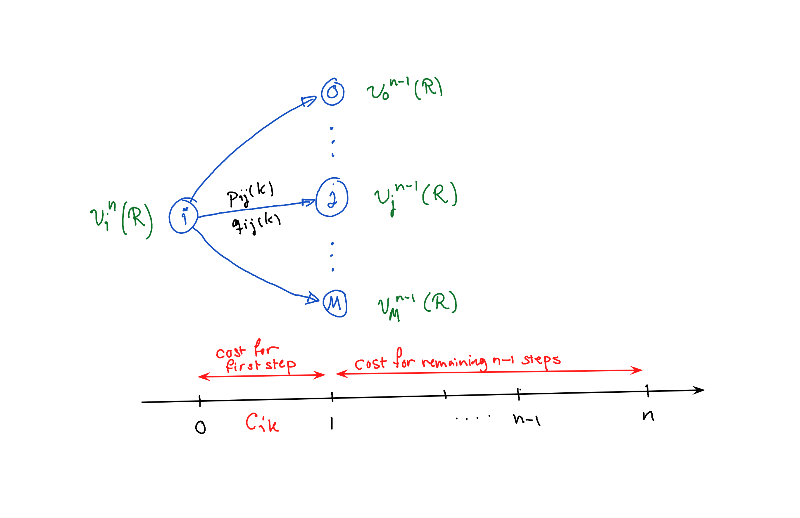- Grundläggande teori för Markovkedjor och Markovprocesser
- Kömodeller baserade på Markovprocesser, inklusive modeller för könätverk
- Modeller för lageroptimering, såväl deterministiska som stokastiska
- Modeller för optimering av reservmateriel
- Marginalallokering
- Dynamisk programmering, för rekursivt beslutsfattande
- Optimal styrning av Markovkedjor, för stokastiska beslutsproblem
SF2863 Systemteknik 7,5 hp

Kursen har fokus på klassisk operationsanalys och matematiska metoder för att analyera och optimera funktionen av olika system. Delsystem analyseras och vi ser på hur helheten påverkas av vad som händer i dessa delar. T.ex. kan vi studera hur en kö beror på ankomstintensiteter, betjäningsintensitet och antalet agenter som är aktiva, och sedan koppla detta till hur det totala systemet, som består av flera sådana kopplade köer, beter sig. Detta är ett exempel på ett stokastiskt system som vi modellerar med hjälp av Markov processer.
Dessutom ingår metoder som dynamisk programmering och styrda Markovkedjor som kan användas för att hitta de bästa strategierna för att styra processer på kort och lång sikt. Ett annat verktyg för heltalsoptimering är marginalallokering. Vi använder det för problem där man har en avtagande avkastning.
Andra system som vi studerar är lagerhållningsystem och underhållssystem.
- Baserat på antaganden om efterfrågan av produkter är det viktigt att bestämma lagernivåer för att säkerställa tillgänglighet, men till en rimlig kostnad.
- För underhåll är det på samma sätt viktigt med tillgänglighet av reservdelar och vi tar fram beslutsunderlag för de beslutsfattare som gör avvägningen mellan kostnad och tillgänglighet.
Information per kursomgång
Information för HT 2026 Start 2026-10-26 programstuderande
- Studielokalisering
KTH Campus
- Varaktighet
- 2026-10-26 - 2027-01-11
- Perioder
HT 2026: P2 (7.5 hp)
- Studietakt
50%
- Anmälningskod
12462
- Undervisningsform
Normal Dagtid
- Undervisningsspråk
Engelska
- Kurs-PM
- Kurs-PM är inte publicerat
- Antal platser
Ingen platsbegränsning
- Målgrupp
- Ingen information tillagd
- Planerade schemamoduler
- [object Object]
- Schema
- Schema är inte publicerat
- Del av program
Masterprogram, tillämpad matematik och beräkningsmatematik, åk 3, OPST
Civilingenjörsutbildning i industriell ekonomi, åk 3, TMAI, Obligatorisk
Masterprogram, tillämpad matematik och beräkningsmatematik, åk 2, OPST, Villkorligt valfri
Masterprogram, tillämpad matematik och beräkningsmatematik, åk 2, CSSE, Villkorligt valfri
Masterprogram, tillämpad matematik och beräkningsmatematik, åk 1, OPST
Masterprogram, tillämpad matematik och beräkningsmatematik, åk 1, Villkorligt valfri
Masterprogram, tillämpad matematik och beräkningsmatematik, åk 2, Villkorligt valfri
Civilingenjörsutbildning i teknisk matematik, åk 3, Valfri
Masterprogram, matematik, åk 1, Valfri
Kontakt
Kursplan som PDF
Notera: all information från kursplanen visas i tillgängligt format på denna sida.
Kursplan SF2863 (HT 2020–)Innehåll och lärandemål
Kursinnehåll
Lärandemål
Efter godkänd kurs ska studenten kunna
- Tillämpa grundläggande teori, begrepp och metoder inom de delar av systemteknik som beskrivs av kursinnehållet för att lösa problem.
- Formulera förenklade tillämpningsproblem inom områden som beskrivs av kursinnehållet med matematiska modeller och optimera dessa med programvara.
- Läsa och tillgodogöra sig matematisk text om exempelvis linjär algebra, analys och systemteknik samt deras tillämpningar, kommunicera matematiska resonemang och beräkningar inom detta område muntligt och skriftligt på ett sådant sätt att de är lätta att följa.
För högre betyg ska studenten dessutom kunna
- Förklara, kombinera och analysera grundläggande teori, begrepp och metoder inom de delar av systemteknik som beskrivs av kursinnehållet.
Kurslitteratur och förberedelser
Särskild behörighet
Slutförd avancerad kurs i Sannolikhetsteori (SF2940 eller motsvarande).
Kurslitteratur
Examination och slutförande
Betygsskala
Examination
- TENA - Skriftlig tentamen, 6,0 hp, betygsskala: A, B, C, D, E, FX, F
- HEM1 - Hemuppgifter, 1,5 hp, betygsskala: P, F
Examinator beslutar, baserat på rekommendation från KTH:s handläggare av stöd till studenter med funktionsnedsättning, om eventuell anpassad examination för studenter med dokumenterad, varaktig funktionsnedsättning.
Examinator får medge annan examinationsform vid omexamination av enstaka studenter.
När kurs inte längre ges har student möjlighet att examineras under ytterligare två läsår.
Examinator
Etiskt förhållningssätt
- Vid grupparbete har alla i gruppen ansvar för gruppens arbete.
- Vid examination ska varje student ärligt redovisa hjälp som erhållits och källor som använts.
- Vid muntlig examination ska varje student kunna redogöra för hela uppgiften och hela lösningen.